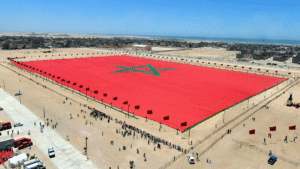Robert F. Kennedy Human Rights and its 2008 Human Rights Award Laureate, Aminatou Haidar, express grave concern about the adoption of the U.S.-sponsored United Nations Security Council Resolution 2797 on October 31. The resolution, which renews the United Nations Mission for the Referendum in Western Sahara (MINURSO) for another year, openly reflects the United States’ unacceptable alignment with Morocco’s illegal occupation of Western Sahara and its efforts to impose the so-called “Moroccan autonomy plan” as the sole framework for negotiations, in complete disregard of international law obligations and the Sahrawi people’s right to self-determination, as enshrined in the UN Charter and the African Charter on Human and Peoples’ Rights.
“The unbalanced approach that now characterizes the UN Security Council’s handling of the Sahrawi issue is deeply regretful and clearly deviates from the principles of international legality and threatens the Sahrawi people’s inalienable right to self-determination,” said Aminatou Haidar, Sahrawi human rights defender and 2008 RFK Laureate. “this bias, led by the United States and France using the Security Council to advance Morocco’s occupation agenda, represents a serious blow to the credibility of the United Nations”, adding that “as a Sahrawi human rights defender, I, along with many of my people, find ourselves losing faith in the fairness of the Security Council and in its ability to uphold international law in a decolonization case that is crystal clear.”
Western Sahara is a territory on the northwestern coast of Africa that Morocco has illegally occupied since 1976 and that the UN classifies as a non-self-governing territory. For nearly 40 years, both Morocco and the Polisario Front have claimed sovereignty over Western Sahara after Spain withdrew from the territory in 1976 without facilitating a transition to independence for the Sahrawi people. While Morocco and the Polisario Front signed a ceasefire agreement in 1991, the vast majority of the territory of Western Sahara has remained under illegal Moroccan occupation, effectively making the territory “Africa’s Last Colony.”
Since the establishment of MINURSO in 1991, the long-promised referendum has yet to take place. Further, the UN Mission has never had a human rights monitoring mandate, despite Morocco’s long record of violently repressing the rights and freedoms of the Sahrawi people. Morocco systematically denies Sahrawis’ freedom of expression, assembly, and association, abuses and arbitrarily imprisons Sahrawi activists, and restricts Sahrawis’ movement within the occupied territories, while simultaneously opening the territory to illegal foreign investment and plundering of its natural resources. The Trump administration has previously ignored these abuses, formally recognizing Morocco’s control of Western Sahara in 2020 in exchange for Morocco normalizing relations with Israel.
With Resolution 2797 adopting Morocco’s autonomy plan as the basis for future negotiations between the parties, the long-delayed promise of self-determination for the Sawhrawi people has been thwarted and risks never being fulfilled in the conditions they deserve.
“To achieve justice in Western Sahara, and to resolve the Morocco-Western Sahara conflict, the Sahrawi people’s right to freedom and self-determination must be respected, and they must be given a voice within an international framework for the resolution of the conflict,” said Kerry Kennedy, president of RFK Human Rights. “The UN Security Council’s resolution is a dangerous departure from these principles,” she added.
UN Member States, especially the members of the Security Council and the African group, must undertake all possible measures to center the human rights of the Sahrawis and hold Morocco accountable for its rights violations, including by establishing an international human rights monitoring mechanism in the territory and mandating Morocco to ratify the African Charter on Human and Peoples’ Rights. Ignoring the rights of the Sahrawi people is an abuse of the values on which the rules-based order stands and sets a dangerous precedent. The United Nations, the African Union, and the international community must continue to work towards Sahrawi self-determination and a full decolonization of Africa.



